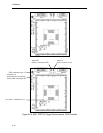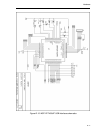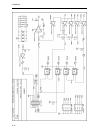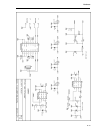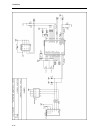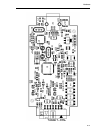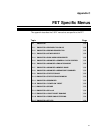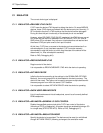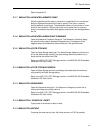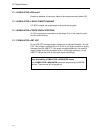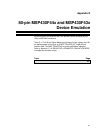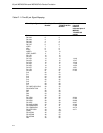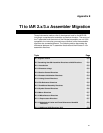
FET Specific Menus
C-2
C.1 EMULATOR
The current device type is displayed.
C.1.1 EMULATOR->RELEASE JTAG ON GO
C-SPY uses the device JTAG signals to debug the device. On some MSP430
devices, these JTAG signals are shared with the device port pins. Normally, C-
SPY maintains the pins in JTAG mode so that the device can be debugged.
During this time the port functionality of the shared pins is not available.
However, when RELEASE JTAG ON GO is selected, the JTAG drivers are set
to tri-state and the device is released from JTAG control (TEST pin is set to
GND) when GO is activated. Any active on-chip breakpoints are retained and
the shared JTAG port pins revert to their port functions.
At this time, C-SPY has no access to the device and cannot determine if an
active breakpoint (if any) has been reached. C-SPY must be manually
commanded to stop the device, at which time the state of the device will be
determined (i.e., Was a breakpoint reached?).
Refer to FAQ, Debugging #10).
C.1.2 EMULATOR->RESYNCHRONIZE JTAG
Regain control of the device.
It is not possible to RESYNCHRONIZE JTAG while the device is operating.
C.1.3 EMULATOR->INIT NEW DEVICE
Initialize the device according to the settings in the DOWNLOAD OPTIONS.
Basically, the current program file is downloaded to the device memory. The
device is then reset. This option can be used to program multiple devices with
the same program from within the same C-SPY session.
It is not possible to select INIT NEW DEVICE while the device is operating.
C.1.4 EMULATOR->SHOW USED BREAKPOINTS
List all used hardware and virtual breakpoints, as well as all currently defined
EEM breakpoints.
C.1.5 EMULATOR->ADVANCED->GENERAL CLOCK CONTROL
Disable the specified system clock while C-SPY has control of the device
(following a STOP or breakpoint). All system clocks are enabled following a GO
or a single step (STEP/STEP INTO). Refer to FAQ, Debugging #17).
C.1.6 EMULATOR->ADVANCED->EMULATION MODE
Specify the device to be emulated. The device must be reset (or reinitialized
through INIT NEW DEVICE) following a change to the emulation mode.



